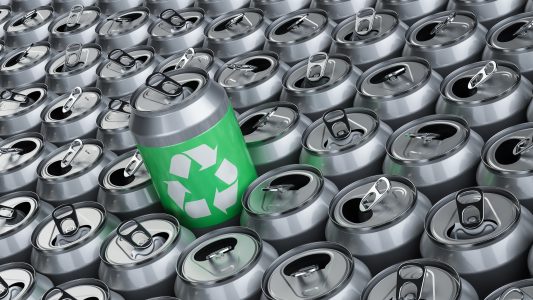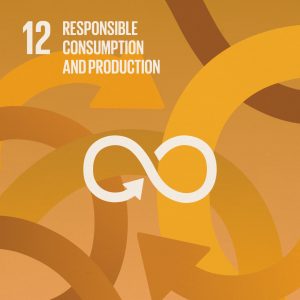by Jesse Teel
I started as the Waste Reduction and Recycling Department Coordinator for Auburn University in August. The learning curve is steep when you begin two weeks before the first football game. Gameday operations are a major focus for our department as we add hundreds of trash cans and recycling bins inside and outside Jordan-Hare Stadium and across campus for all to properly dispose of their waste and recycling.

As our team collects aluminum cans and plastic bottles, I ask myself what happens to aluminum cans when you recycle them? I have a rough idea but have never seen the process. I have heard that recycling aluminum helps conserve energy and resources. According to aluminum.org, making a can from recycled aluminum saves more than 90% of the energy required to make a new can.
I decided to find out if there was an expert on campus. Materials Engineering seemed like a good place to start. I heard about Dr. Jeffrey Fergus, Professor of Materials Engineering and Associate Dean for Undergraduate Studies and Program Assessment in the Samuel Ginn College of Engineering. Dr. Fergus teaches three entry level courses for the Materials Engineering major: Materials for Sustainable Energy Production and Storage, Materials and the Environment, and Mineral Resources: Processing and Availability, all one credit courses for the Sustainability Minor. Fergus says you do not need to have prerequisites or be an engineering student to take these classes. In fact, he would welcome more non-engineering students in the classes because the information can help students understand sustainability from a materials perspective, no matter what their major.
Dr. Fergus told me that aluminum is one of the most abundant elements in the earth’s crust – the third most, in fact. Aluminum is a very stable oxide, Fergus said, making the recycling process extremely difficult until 1887 when two chemists invented the Hall-Héroult process for smelting aluminum. He continued, the ore is dissolved in a molten salt and then they electrochemically play out the aluminum which takes a lot of energy. Once refined into an aluminum alloy that can be manufactured, dependent on the recycling process, the aluminum is the same as the original alloy each time it is recycled. That means aluminum can be recycled an infinite number of times.
Imagine you are on Auburn’s campus in the fall on a Saturday. Tens of thousands of people are enjoying food and beverages while they wait for their favorite football team to start playing. Many of these beverages will be in aluminum cans. The recycling process starts when you take your can and put it into the correct recycling bin on campus. These cans will be collected after the game and taken to the Facilities Management Complex where they are put into a recycling compactor. From here, the compacted mixture of plastic and aluminum is taken to a materials recovery facility (MRF) where it is sorted. The aluminum is then compressed into bales (large cubes) so it is convenient for shipping. From there it will go to a facility where it will be shredded, sorted (magnets to pull any steel out), melted (impurities burned off or scraped off the top as dross), poured into casts and cooled as ingots, heated and passed through rollers until it is thinned to 0.25mm thick, and then sent to a manufacturer where it is turned into an aluminum product (probably back into cans).
We could do a better job of recycling aluminum. According to the Environmental Protection Agency, the United States produced around 3.9 million tons of aluminum in 2018 and recycled about 35% of that. About 3.2 million tons of aluminum was landfilled or combusted that year. Why don’t we recycle more aluminum? Americans report that lack of knowledge causes them to recycle incorrectly. Other reasons include lack of access and lack of time. Many practice wishcycling, tossing something in a recycling bin with the hope that it is recyclable. This leads to the contamination of recycling and can cause an entire truckload of recyclables to be landfilled.
So next time you are on campus finishing your delicious beverage of choice in an aluminum can, find the correct recycling bin labeled Aluminum Cans and toss that baby in there so it can be recycled. It could go on to become another can, a car part or even launched into space!
GET CONNECTED
Email: aureuse@auburn.edu
Web: auburn.edu/recycling
Twitter: @AU_Recycles
Instagram: @au_recycles
Facebook: auburnuniversityrecycles
Jesse Teel works within Facilities Management as the Coordinator for the Waste Reduction and Recycling Department.
Learn about the SDGs & AU and our contributions related to this post.





